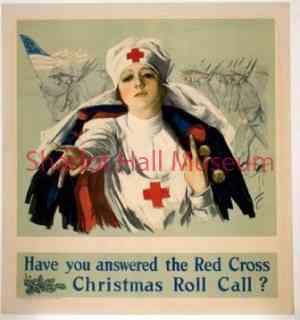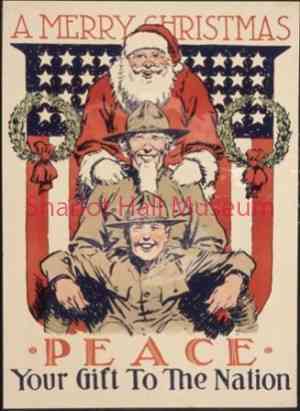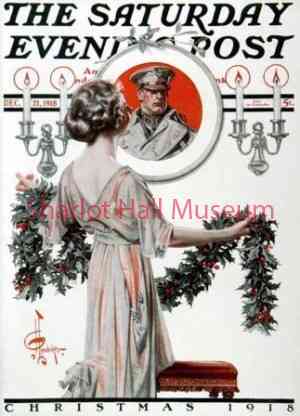By Mick Woodcock
Arizonans had much to be thankful for at Christmas in 1918. The guns had fallen silent in Europe as an armistice went into effect on November 11. Soldiers had started to return home, although eight divisions had already been assigned to the army of occupation. A newspaper article from the Associated Press indicated, “Every effort will be made to give preferential passage to those soldiers eager to return home at once.”
 Efforts to help the army of occupation in Germany celebrate Christmas involved a number of organizations. According to an Associated Press article dated December 23, 1918, “The Red Cross has provided 30 carloads of candy, the quartermaster department four carloads of pastry, the Y. M. C. A. the decorations for the Christmas trees, and the Knights of Columbus the cigarettes, candy and gum. Every officers’ mess and every company of soldiers will have a Christmas tree. The Christmas dinners will consist of goose, duck and chicken, and there will be no turkey or cranberry sauce. The Salvation Army is baking huge quantities of doughnuts and hopes to provide each soldier with three of them.”
Efforts to help the army of occupation in Germany celebrate Christmas involved a number of organizations. According to an Associated Press article dated December 23, 1918, “The Red Cross has provided 30 carloads of candy, the quartermaster department four carloads of pastry, the Y. M. C. A. the decorations for the Christmas trees, and the Knights of Columbus the cigarettes, candy and gum. Every officers’ mess and every company of soldiers will have a Christmas tree. The Christmas dinners will consist of goose, duck and chicken, and there will be no turkey or cranberry sauce. The Salvation Army is baking huge quantities of doughnuts and hopes to provide each soldier with three of them.”
Meanwhile, back in Arizona, it was announced by the U.S. Food Administration that Christmas candy would not be restricted. According to a newspaper article, “Last year the nation faced a serious shortage at Christmas time, and the manufacturers were allowed to use only 50 per cent of their normal requirements of sugar. This brought about a candy shortage….” The need for sugar rationing was deemed passed and the food administration was not asking for any limitations on Christmas candy sales.
This was one of several rules relaxed or abolished by the food administration, leading some to believe the administration was no longer needed or at work. This was not the case as an article stated, “’The Lever act creating the food administration imposes upon us certain obligations which will continue until Presidential proclamation releases us from further duty, and particularly the obligation to curb profiteering and speculating in licensed food commodities.’”
 In Prescott, the municipal Christmas tree was set up on the plaza as it had been the previous year and a program was presented. This included a visit from Santa Claus, music by the Prescott band, vocal numbers under the direction of Mr. Suman, a quartette from Whipple Barracks and Miss Babe Morrison singing “Silent Night.” The Weekly Journal-Miner stated, “An unusually attractive program has been arranged and even with the light fall of ‘the beautiful’ which but tends to bring the spirit of Christmas cheer closer to the hearts of those in Prescott, it is expected that this year’s tree will be one of the best ever seen in Prescott.”
In Prescott, the municipal Christmas tree was set up on the plaza as it had been the previous year and a program was presented. This included a visit from Santa Claus, music by the Prescott band, vocal numbers under the direction of Mr. Suman, a quartette from Whipple Barracks and Miss Babe Morrison singing “Silent Night.” The Weekly Journal-Miner stated, “An unusually attractive program has been arranged and even with the light fall of ‘the beautiful’ which but tends to bring the spirit of Christmas cheer closer to the hearts of those in Prescott, it is expected that this year’s tree will be one of the best ever seen in Prescott.”
The community remembered the less fortunate. “Over fifty boxes were planned for and through the generous help of the merchants of Prescott, Christmas cheer will be felt in many a home which otherwise would have not known the Christmas spirit at least this year.” The article went on to state that there were Christmas stockings for children, which contained candy, nuts and popcorn.
 A letter from Corporal Clarence Moffett, Company D, 158th Arizona Infantry indicated that he had not received a letter from his Prescott friends in awhile and that some sort of communication would be appreciated. He also stated that it looked as if the Arizona regiment would be going to Germany as part of the army of occupation. As an answer to Moffett’s wish for letters, Billy Greenwood of Sam Hill Hardware Company where Moffett was formerly employed, put together a thirty-nine-foot long roll of paper with messages from forty-seven acquaintances of Moffett and sent it off to France.
A letter from Corporal Clarence Moffett, Company D, 158th Arizona Infantry indicated that he had not received a letter from his Prescott friends in awhile and that some sort of communication would be appreciated. He also stated that it looked as if the Arizona regiment would be going to Germany as part of the army of occupation. As an answer to Moffett’s wish for letters, Billy Greenwood of Sam Hill Hardware Company where Moffett was formerly employed, put together a thirty-nine-foot long roll of paper with messages from forty-seven acquaintances of Moffett and sent it off to France.
Such was the holiday season in Prescott. The war was over. Rationing was being relaxed. Local men would be home at some point. For some, letters arrived indicating the death of a loved one. For Ernest Love’s parents, he was missing in action and they would not know of his death until the following April. The war had touched all, some more than others. New Years Day 1919 ushered in the beginning of a new era for all.
“Days Past” is a collaborative project of the Sharlot Hall Museum and the Prescott Corral of Westerners International (www.prescottcorral.org). This and other Days Past articles are also available at https://sharlothallmuseum.org/articles/days-past-articles.l. The public is encouraged to submit proposed articles and inquiries to dayspast@sharlothallmuseum.org. Please contact SHM Library & Archives reference desk at 928-445-3122 Ext. 2, or via email at archivesrequest@sharlothallmuseum.org for information or assistance with photo requests.


